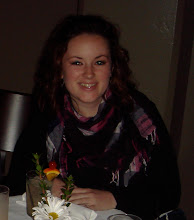So in listening to the notes this week, I had a thought. Wouldn't it be cool to develop your own learning theory? That would be amazing! To just be sitting around, planning, thinking, cleaning, making a grocery list and bam! you get this idea! All of your knowledge suddenly comes together and you create a theory! I should make that a goal in life. :)
So this week's theory does look at the big idea. Of course I am always trying to fit this knowledge into elementary school standards. How can I take elementary students and help them think flexibly??
I love the statement made in our notes: the way students are taught influences the way that they think. Not a genius or original idea, but thought-provoking none-the-less. Therefore, we must remember this as educators and be very aware of how we are molding minds. Not just what we say, but how we say it has a great effect on others.
Funnily enough, the example with the "bat" is exactly how we teach multiple meaning words where I tutor.
I think it is very important to build on what you know. If we simply present a new piece of information each day to our students, it just becomes a bunch of unrelated facts to remember; however, if we can find a way to build upon our previous knowledge, it ties everything together and gives kids/people that AHAH! moment that we love to have when we learn. For example, when I teach my students, I want the to always remember that no matter what we talk about in class, it always relates back to information. What is the point of a multimedia project? To share information. What is the point of a database? To give or analyze information. What is the point of the internet (also a database)? To give information. So in each new unit that I teach...I always ask the question...what is the purpose? And they always know that our main point with technology is to get and give information. They build their knowledge from one unit to the next. When we learn buttons on the button bar, they see that that information can transfer from blogging, to websites, to Power Point, to Word, to Excel, and so on. It excites them to know that they do not have to go learn something new each time they come to my class, but that they transfer their knowledge from one application to the next.
I do think that I am looking at CFT very simply. I do also think that I am simplifying it because I am thinking in terms of elementary school (which was one of the points...not to over-simplify). I would like to try and "bump up" my educational techniques and go from teaching the "facts" to using case-based scenarios to answers questions about the things we learn.
Wow, once again, I want to try out another theory in my own classroom. Is it possible to use all of these theories at some point within your own classroom? Are there some theories that you would prefer over others? That is a little off topic, but as we are coming to a conclusion in our class, I wonder which theories everyone would rank at the top...ones that they would want to try out before the others. Would using all the theories make your class more or less effective?
Back to CFT, this is definitely higher order thinking. Not just question and answer, but here is some information, now can you apply it to this case? Can you transfer your knowledge from one thing to the next? Good stuff.
I know that we do not have to create a website for our final project, but while reading and listening to the notes...I think I had a good idea for one, so I will share it.
Similar to the way we had to read 3 different articles and then read the plantation letters...the website would give readings about each theory that we have learned. Then the blogs that we have written would be given as readings (similar to the Plantation Letters). Questions would be asked, comparisons would be made and a scenario would be given requiring application of knowledge. That is just a basic run-down, but that is what I would do.
This blog is a little all over the place this week. This theory is making my mind run all over the place with ideas here and there about this and that...which I think is a good thing. At first I wasn't loving this theory, but the more I understand it, the more I love it.
